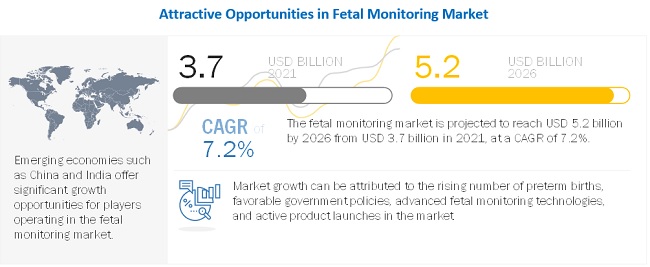views

COVID -19 Impact on the Fetal Monitoring Market
The coronavirus pandemic has compelled regulatory bodies, such as the FDA, to ease their regulatory norms for fetal monitors to support the uninterrupted care regime of expectant mothers. Relaxations in rules have paved the way for several key players to smoothly launch fetal monitors equipped with tele-ultrasound monitoring, noninvasive features, and portable technologies. For instance, the FDA released its updated April 2020 FDA guidance amid the pandemic, under which Philips successfully launched its fetal monitor, Avalon CL, in the US on June 12, 2020. The FDA’s enforcement policy for noninvasive fetal and maternal monitoring devices aims to increase access to devices that could reduce the need for in-clinic visits and reduce the burden on doctor’s offices and hospitals during the pandemic.
The outbreak of COVID-19 has led to various valuable partnerships among companies, which is anticipated to fuel the market's growth. For instance, in January 2021, Israel-based Nuvo Group (offering a remote pregnancy monitoring platform) entered into a commercial agreement with Axia Women’s Health, an innovative women’s health network. Under the agreement, Axia Women’s Health will be able to prescribe INVU to expectant mothers, which is expected to reduce the risk of exposure during COVID-19.
The fetal monitoring market is expanding with the latest innovative technologies, backed by escalating research and product launches. Fetal monitoring technologies are now being streamlined to provide greater assistance in utero fetal surgeries, consisting of challenging physical fetal access and technological complications. Fetal cardiac assessments have also witnessed progress that supports high-fidelity hemodynamic and continuous physiologic monitoring, thus enabling early diagnosis and treatment.
Computer-Aided Decision Support Systems and Artificial Intelligence (AI) are also utilized in continuous cardiotocography (CTG) or fetal heart rate (FHR) auscultation during labor. The patient’s electronic health records (EHRs) are utilized along with computational methods, machine learning, and deep learning tools.
Research and technological advancements in fetal monitoring systems have increased focus on noninvasive monitoring procedures. Obstetrics has been introduced with noninvasive diagnosis technologies such as Doppler studies, cell-free fetal DNA assessment, electronic fetal monitoring (EFM), and fetal acid-base status.
For More Information, Download PDF Brochure @ https://www.marketsandmarkets.com/pdfdownloadNew.asp?id=35700261
Fetal and neonatal assessments are carried out during antepartum via percutaneous umbilical cord blood sampling and during intrapartum with fetal scalp blood sampling immediately after birth. Fetal phonocardiography has been integrated with advanced data acquisition systems and databases. Progressing data analytics, synthetic data generation by advanced mathematical models, and classifications & processing algorithms are under active research & development to increase fetal motoring data processing efficacy.

The key manufacturers in fetal monitoring market are expanding their product lines to include portable and wireless monitoring systems that are accurate, safe, and affordable. The key players in the market are also integrating telecommunication into these devices. For instance, Philips launched the handheld and tele-ultrasound solution, Lumify, in Japan and Avalon CL in the US in 2020.
Similarly, the strategic collaboration between MindChild Medical and Henry Schein Medical expanded the MERIDIAN M110 Fetal Monitoring System's distribution and supply, a noninvasive intrapartum monitor in the US, in 2019.
Based on the method, the market is segmented into invasive and noninvasive. In 2020, the noninvasive accounted for the largest share of this market. Noninvasive methods are widely accepted for their safer method of diagnosing and monitoring the fetus, especially in high-risk pregnancies. The rising approvals of various noninvasive monitoring devices and the incoming advanced technologies drive the growth of this segment.
The major players operating in fetal monitoring market are Cardinal Health, Inc. (US), Koninklijke Philips N.V. (Netherlands), GE Healthcare (US), Siemens Healthineers (Germany), FUJIFILM SonoSite, Inc. (US), Natus Medical Incorporated (US), Huntleigh Healthcare Limited (UK), The Cooper Companies Inc. (US), CONTEC Medical Systems Co., Ltd. (China), EDAN Diagnostics, Inc. (China), Neoventa Medical AB (Sweden), Bionet Co., Ltd. (South Korea), Progetti Srl (Italy), TRISMED Co., Ltd. (Republic of Korea), ShenZhen Luckcome Technology Inc. (China), MedGyn Products, Inc (US), Dixion (Germany), Promed Group Co., Ltd. (Hong Kong), Advanced Instrumentations (US), BRAEL-Medical Equipment (Poland), GPC Medical (India).












